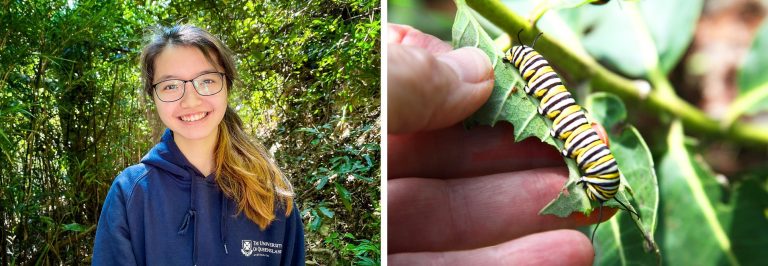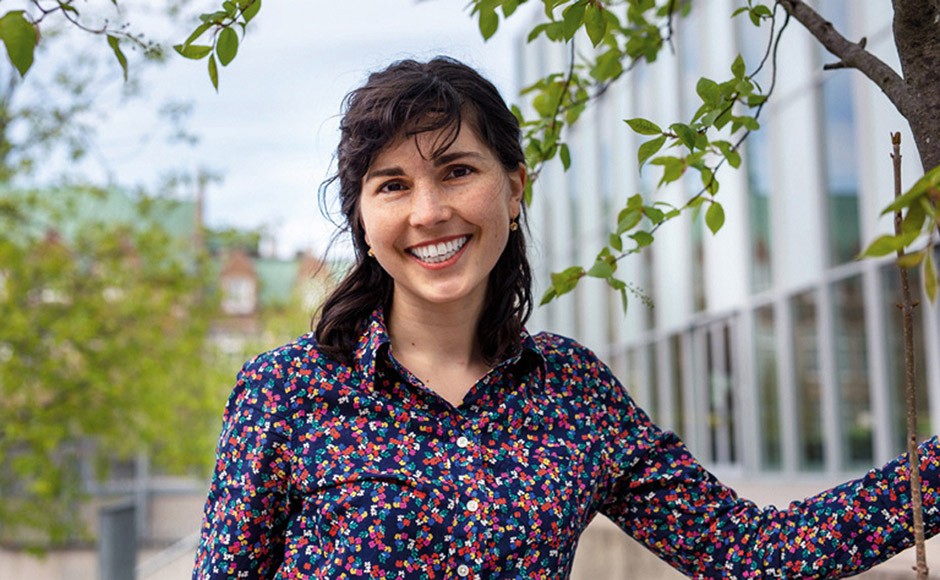This Concordia PhD student is turning Montreal balconies into biodiversity hotspots

How can we better harness the green potential of urban spaces? For Concordia PhD student Nicole Yu, the answer came in the form of the Balcony Garden Project. It’s a participatory science initiative that invites residents across select Montreal boroughs to transform their balconies into vibrant habitats for monarch butterflies and other pollinators.
Yu is based in the Department of Biology and is working with the Ziter Urban Landscape Ecology Lab in a bid to merge urban living with biodiversity conservation.
“These projects show the people’s desire to help,” explains Carly Ziter, associate professor of biology. “There is so much good intention within the City of Montreal to support biodiversity, students and science. One of the most important jobs we have, as scientists, is to find ways to harness all the good intention and channel it in the right direction through evidence-based practices, which studies like Nicole’s support.”
Pascale Sicotte, dean of the Faculty of Arts and Science, emphasizes the participatory nature of Yu’s work.
“Increasing local urban biodiversity through this exciting project truly is a people-powered endeavour,” Sicotte says. “It is empowering for the participants.”
Urban biodiversity enhances quality of life
The Balcony Garden Project delves into the untapped potential of balconies as green spaces. By introducing native plants, particularly milkweed (Asclepias), participants will not only beautify their outdoor spaces but also attract urban pollinators like monarchs. This summer, the project is focusing on a pilot study to gauge the capacity of urban balcony gardens to support these butterflies.
Yu will provide participants with a curated selection of plants and comprehensive care instructions. Throughout the summer, they will have the rewarding task of observing monarchs and other pollinators that frequent their balcony gardens. Regular reporting to researchers will help track the project's impact and gather valuable data.
Under Ziter’s guidance, the project brings together a diverse group of participants from various boroughs, including Rosemont–La Petite Patrie, Hochelaga-Maisonneuve, the Sud-Ouest, Verdun and Lachine. Over 170 individuals have already signed up as potential participants.
 Carly Ziter: “These projects show the people’s desire to help.”
Carly Ziter: “These projects show the people’s desire to help.”
Assisting in this green endeavour is local company Jardin Buzz. Specializing in promoting pollinator-friendly native species, they will provide the plants and offer practical gardening advice to participants. Additionally, select Concordia students and recent graduates will be actively engaging in outreach and scientific communication as project research assistants.
“Urban biodiversity plays a crucial role in enhancing the quality of life in cities,” Yu explains. “Beyond aesthetic appeal, green spaces contribute to reducing heat islands, improving mental and physical health and fostering a deeper connection with nature. By empowering residents to green their balconies, the project aims to reintroduce nature into our increasingly urbanized landscapes.”
With plans to replicate the initiative in other cities, including Hong Kong, the Balcony Garden Project serves as a scalable model for urban biodiversity conservation.
Participatory research in action
“Often, we forget what was, because we do not see it anymore — simply because of gradual declines,” Sicotte reflects. “Many of us will remember seeing butterflies or fireflies in the city, but unfortunately, it is not the case anymore. It's when we create conditions to see them again that we truly realize the extent of our losses.”
Come June, participants will begin to keep watch for Monarch butterflies or other pollinators that may grace their balconies. By monitoring milkweed plants for eggs and caterpillars every three days and conducting monthly observations, they will actively contribute to the project's success.
Participants will learn alongside researchers, equipped with training sessions, data sheets and do-it-yourself science kits that the team provides.
Interested residents can sign up for the Balcony Garden Project until early May and expect confirmations from the team by mid-May. For those outside the selected boroughs, the project welcomes anecdotal stories about monarch sightings.
Discover Concordia’s Department of Biology.
Sign up for the Balcony Garden Project.


